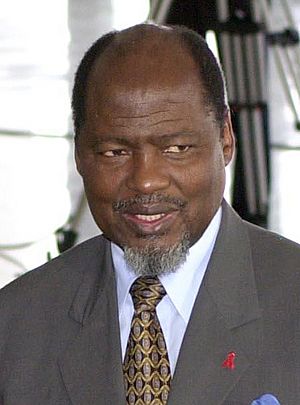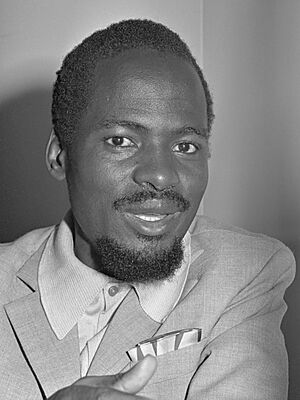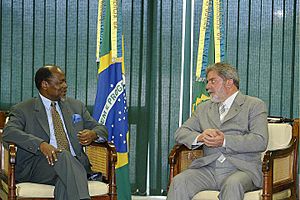Joaquim Chissano facts for kids
Quick facts for kids
Joaquim Alberto Chissano
|
|
|---|---|

Chissano in 2004
|
|
| 2nd President of Mozambique | |
| In office 6 November 1986 – 2 February 2005 |
|
| Prime Minister | Mário da Graça Machungo Pascoal Mocumbi Luísa Diogo |
| Preceded by | Samora Machel |
| Succeeded by | Armando Guebuza |
| Minister of Foreign Affairs | |
| In office 25 June 1975 – 19 October 1986 |
|
| Preceded by | Position established |
| Succeeded by | Pascoal Mocumbi |
| Personal details | |
| Born | 22 October 1939 Malehice, Gaza Province, Portuguese Mozambique |
| Political party | FRELIMO |
| Spouse | Marcelina Rafael Chissano |
| Children | 4 |
Joaquim Alberto Chissano (born 22 October 1939) is a Mozambican politician. He was the second President of Mozambique, serving from 1986 to 2005. Many people credit him with helping Mozambique become a peaceful and successful democracy after a long civil war. After his time as president, Chissano became an important leader and diplomat for his country and the United Nations. He also led the African Union from 2003 to 2004.
Contents
Early Life and Education
Joaquim Chissano was born in a small village called Malehice, in the Gaza Province of Mozambique. At that time, Mozambique was a Portuguese colony. Chissano was the first black student to attend the only high school in the colony, called Liceu Salazar.
After high school, he went to Portugal to study medicine at the University of Lisbon. However, his political ideas caused problems, so he moved to France. There, he continued his studies at the University of Poitiers. In 1962, he went to Tanzania. He joined a political group that later became the Mozambique Liberation Front (FRELIMO). A year later, he stopped his studies to focus on the fight for Mozambique's independence.
Political Career
Chissano was one of the first members of FRELIMO. This group wanted Mozambique to be free from Portugal. Chissano played a key part in talks that led to the Lusaka Accord in 1974. This agreement helped Mozambique gain its independence in 1975. The first President of Mozambique, Samora Machel, then made Chissano the Minister of Foreign Affairs.
Becoming President
Chissano became president and leader of the FRELIMO party in 1986. This happened after President Samora Machel's plane crashed in South Africa. Chissano worked to end the Mozambican Civil War. In 1992, he signed a peace treaty with the rebel group. This treaty promised no punishments for past actions and gave the rebels half of the positions in the Mozambican army. The rebels later formed their own political party called Renamo.
Chissano was reelected president in 1994 and again in 1999. In 1999, he won against the former rebel leader, Afonso Dhlakama. After winning reelection, Chissano focused on reducing poverty. His efforts faced challenges, like a big flood in 2000. However, Chissano helped convince the G8 group of countries to cancel a large part of Mozambique's debt in 2005.
Chissano decided not to run for a third term in the 2004 elections. The country's constitution would have allowed him to run again. During his time as president, almost 3 million people in Mozambique moved out of extreme poverty. The country's economy grew by about eight percent each year. Also, the number of children dying before age five went down by 35%. Primary school attendance also increased by 65%.
Life After the Presidency
After leaving the presidency, Chissano became an important international figure. He has worked for peace as an envoy and negotiator for the United Nations. He was also the leader of the African Union from July 2003 to July 2004.
In 2006, the United Nations Secretary-General Kofi Annan asked Chissano to help solve a conflict in Northern Uganda and Southern Sudan. In 2007, Chissano received the first Prize for Achievement in African Leadership. This award is given to African leaders who have done great things for their countries. The judges said that Chissano's choice not to seek a third term showed that democracy was more important than any single person.
In 2010, Chissano wrote an article about water scarcity in Africa. He is also a member of the Fondation Chirac's honor committee. He serves as a director at Harmony Gold Mining, a gold mining company in South Africa. He is also an important member of the Sergio Vieira de Mello Foundation.
In 2014, Chissano spoke in favor of LGBT rights in Africa. In 2023, he was named Honorary President of a new group called the International Association of Friends of the Algerian Revolution. This group aims to support the ideas of the Algerian Revolution and help people in colonized countries.
Awards and Honors
- On 9 December 2004, he received the Order of the Athir from Algeria.
- In February 2005, he received an honorary degree from the University of Minho in Portugal. This was for his work as president and his role in bringing peace to Mozambique.
- In 2006, he received the Chatham House Prize.
- In 2007, he won the Mo Ibrahim Prize for Achievement in African Leadership. This award recognized his efforts in bringing peace, democracy, and economic growth to Mozambique after the civil war. It also honored his work outside his country.
- He leads the Joaquim Chissano Foundation and the Forum of Former African Heads of State and Government.
- On 24 May 2011, he received an honorary doctorate in Literature and Philosophy from UNISA. This was for his political and diplomatic work over five decades.
Personal Life
Chissano is married to Marcelina Rafael Chissano. They have four children. Chissano speaks Portuguese, French, English, Swahili, and Changana.
See also
 In Spanish: Joaquim Chissano para niños
In Spanish: Joaquim Chissano para niños
Images for kids
 | Tommie Smith |
 | Simone Manuel |
 | Shani Davis |
 | Simone Biles |
 | Alice Coachman |




